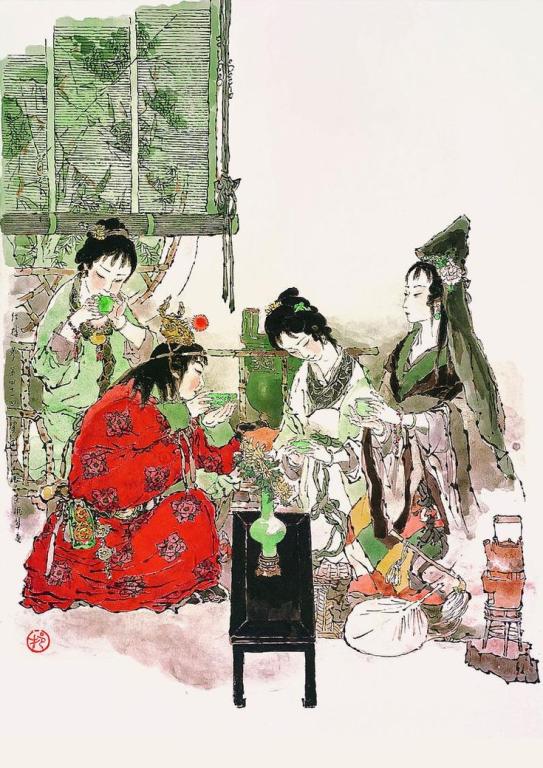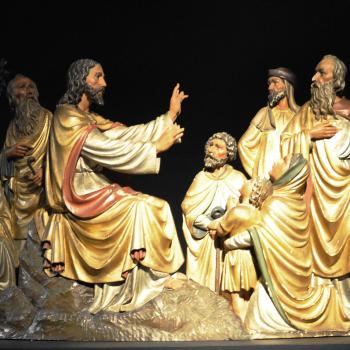
(traditional Chinese print)
(A sermon by James Ishmael Ford, delivered at the Neighborhood Unitarian Universalist Church in Pasadena, on the 24th of September, 2023)
***
One day while walking quietly together, out of the silence the Buddha’s attendant Ananda declared, “Teacher, to have companions and comrades on the great way is so amazing! I have come to realize that friendship is fully half of an authentic spiritual life. They proceeded along quietly for a while more, before out of that silence the Holy One responded. “No, dear one. Without companions and comrades, no one can live into the deep, finding the true harmonies of life, to achieve authentic wisdom. To say it simply, friendship is the whole of the spiritual life.”
Upaddha Sutta (author’s paraphrase)
When Reverend Omega invited me to speak today and told me that a touchstone for recent sermons has been “welcoming,” I immediately thought of a saying I’d heard many years ago. Invite the guest and treat that person as the emissary of God. For three days.
Three is one of those magical numbers that we humans really like. It has been called the “prefect number.” It pops up in pretty much, maybe in all, of the world’s religions, often centrally. Think of Christianity’s Trinity or Hinduism’s Trimurti. In the west at least, “three” often conveys the sense of completeness. And I suspect that’s part of the admonition. Three and done.
However, what if after those three days the guest isn’t gone, isn’t so clear. Make broad hints over breakfast? So, where are you going to next? Maybe something more direct? You know, poke them with a sharp stick. In church of course, all we have to do with a visitor if we want to get rid of them, is on the fourth day to invite them to join a committee. If we’re serious ask them to chair it. That can take care of any lingering problems with, well, lingering.
Now, while what the boundaries are, are unclear, the call to welcome, to some form of hospitality itself is ubiquitous. There are clear admonitions in Judaism and in Islam to treat the stranger, sojourner, refugee with care. There are similar admonitions in ancient Greece, where hospitality was considered a “sacred obligation.” In both India and Nepal there’s a guiding principle, Atithi devo bhava, which means the “guest is God.”
The ancestors tell us welcoming is important. Maybe we feel it is true in our guts. I do. But we, I mean UUs specifically, spiritually we’re from Missouri. So, why? Picking at the whole thing of welcoming there are questions. Who are we inviting? What are we to do when the person arrives? And when are we free of the obligations? Or are we ever?
And with that, what about the guest? I think of the parable of the Good Samaritan. People seem always to assume they play the part of the Samaritan. Actually, I suspect, we’re supposed to hear it from the perspective of the victim. After all, sometimes, maybe more often than we think, we’re actually the guest. And with that all those questions. Who is inviting us? What are we to do when we arrive? And when are we free of the obligations? Or are we ever?
And then there’s the deeper why, yet Why hospitality? Why guests? Why hosts?
For me “guest” and “host” are themselves deeply important spiritual terms. The Zen way has been my primary spiritual discipline for well beyond fifty years. The core assertion of Zen is the exact identity of our individuality, precious and temporary, and the great mystery of wholeness, sometimes called one, and in Zen more often called empty or boundless. In ancient Zen literature, these two perspectives, the phenomenal world and that boundless are often framed as guest and host.
Guest stands for the passing self, you, and me. Host is that place beyond distinctions and separation. Our common sense tells us that we are one or the other. But those roles can and do change. The dynamic of it all is the play of the universe, rising, interacting, falling, and then repeating in some new combination. Sometimes we’re host. Sometimes we’re guest. Sometimes we cannot tell the difference.
Understanding this in a bone and marrow way is about healing the ancient wound. Despite what you may pick up about Zen in popular culture, this healing project is what Zen is actually about. I feel I can go farther. There are deep intimations in many, I suspect all of the world’s religions that call us into relationships as the heart of the perennial wisdom.
And that’s where we come in. Unitarian Universalists. Our spirituality is very much this worldly. Our encounters with the deep are found in how we meet each other and the cries of the world. So, guest and host. And the practice, our core spiritual practice, is welcoming. The secrets of intimacy.
Another way to say what we are being invited into with this admonition to welcoming here in this community is radical hospitality. I’m sure this is not the first or second or third time you’ve heard the term. We UUs use it a lot these days.
As near as I can tell it’s most closely associated originally with the Benedictine Order in the Catholic Church. And mostly it seems to live at the farther left wing of the Christian community. But then we UUs don’t claim uniqueness in our tradition, only focus on the here and now. We have a way, a path, a sort of religious naturalism, and I suggest very near the heart of this way is reaching out to another.
This call to welcoming is a call to open arms, and, absolutely, to open eyes. Embracing hospitality even radical hospitality, doesn’t mean not being responsible. There are dangers in this life, and that includes human behaviors. Guest and host is the dance of the heart. And nearly all dances have rules of some sort.
It is against all this I find myself reflecting on Reverend Omega’s charge. Welcoming. And back to who is being welcomed? I think of the Passover tradition where there’s always an extra place at the table. If you’re unfamiliar, that setting is for Elijah. In Jewish folklore, and carried over into Christian myth, as well as in Islam, Elijah is a bringer of good news, a prophet or sometimes an angel of God. So, the guest, whether stranger, or the poor, or the lost and the left behind, that person sometimes turns out to be God. The guest is God as they say in the great subcontinent.
When we set out a place for a stranger, when we are welcoming, we are opening our hearts to new possibilities. When we accept being welcomed, we are also inviting ourselves to some place of vulnerability and exposure. Which the wise sometimes says is divine.
In many ways I consider this practice of welcoming of extending and accepting welcome, as the central spiritual practice of Unitarian Universalism. And practice, a delightful pun in our language, meaning both preparing and doing. And. Probably why my immediate thought when the question of welcome is raised, was what are the actual obligations?
You know, for us here and now. In this world. Those rules. The pattern of the dance.
Definitely, there are bounds. So as an example, I found a rule at a Catholic Worker farm in England. If you don’t know the Catholic workers, I hope you’ll take a little time to look them up. They are the embodiment of radical hospitality.
That said, the rule.
You need to live peacefully with the other people here. If you are violent or if you threaten any of the other people living in the house it is possible that we will ask you to leave without warning. We also have some kitchen rules and we can make other rules when it is necessary. If you break any of the rules you may get a formal warning. If you receive more warnings you will be banned for one or two weeks. After 4 warnings you will be asked to leave.
Now, in the mix, it also means erring on the side of generosity, of kindness. The Catholic workers allowed four egregious examples of bad behavior before someone was asked to move on. But move on is also part of the dance.
So, getting to the nitty gritty. What does welcoming look like, from both sides the dance? When we are being invited into the mystery, into a way of healing our ancient wounds, how do we engage? What rules of thumb govern the dance of welcoming?
Let me suggest we might find what we need in a rough outline sort of way through Emily Post. She, or these days, probably the team of researchers passed through an editor’s pen, suggests six good rules of thumb for playing the part of the host. Invite clearly. Plan well. Be welcoming and attentive. Be flexible and gracious. Be the leader of the pack. And finally. Be appreciative. Each one of these could be the subject of a talk, certainly is an invitation into reflection, contemplation, meditation, prayer.
Similarly, Emily Post gives us six rules of thumb for playing the part of the guest. Tell the host whether you’re attending. Be on time. Be a willing participant. Offer to help when you can. Don’t overindulge. And finally. Thank your host twice.
You want to be welcoming? You want to be welcomed? You think there may be something profound and true in this meeting of hearts, of guest and of host? Can it reveal the secrets of human companionship, and maybe even be a path into the healing of broken hearts? Well, if it’s as important as it claims to be, as we may feel in the depths of our beings that it may be, then we take our guidance from wisdom whereever it may come. Even, from Emily Post.
Welcoming. And specifically welcoming within spiritual community. We are inviting and at the same time being invited into covenant. A wonderful old word, central to our liberal religious community existing as we do without creeds, statements of belief to define us. Covenant is not a one-way road. Rules for guest. Rules for host. Loose, forgiving, but there. Covenant is about responsibility. People are responsible for their actions. And when we gather within covenant, we are expected to hold each other to bounds of decency and care.
And it turns out we’re being invited to discover within these relationships of welcome, mystery and beauty. Hope and possibility. This is important, we’re talking about the contours of our lives. And what might be.
Of course, anyone who has taken on a serious practice of any kind, music, art, whatever. You learn the rules. You embody the rules. For a time. And then you need to let go of the rules. In Zen we speak of not knowing. Like that.
With Radical hospitality for me it means to be willing to not know precisely what the boundaries are. To be comfortable with a little discomfort. We humans tend to be, well, weird. Cut us some slack. Radical hospitality, the heart of welcoming means taking chances. Knowing there are ways it can go wrong, but again erring on the side of generosity, erring on the side of love. Love. Another word. For another time. But lingering in the background of all this welcoming.
Often, out of the practices of welcoming, it seems, we discover ever deeper intimacies with what at one time we thought were “others.” Other people. Other creatures. This planet upon which we walk, and the air that we breathe. Our spirituality of welcoming, of presence, often ends up a call to reaching out, and to helping. To each other. And to our planet. The great dance of hearts, the intimate way.
This way really boils down simply enough. I recall when I first attended a Unitarian Universalist worship service. Forty years ago, now. A little more. The sermon, well, it wasn’t all that much. But, in the coffee hour following I found myself explaining to a member who asked me about my religious orientation, that I was a Buddhist.
She was in her eighties, probably late eighties, had that tightly curled white hair favored by some in her generation. Gosh, as I think about it, she would be pushing a hundred and twenty today. Anyway, she had thick-lensed glasses that made her eyes appear owl-like. I recall they were brown and at least within my imagination speckled with bits of yellow. I also feel I recall a hint of gardenias hanging in the air.
She responded enthusiastically to my statement, “Oh wonderful. I don’t know anything about Buddhism.” There was a pause then she asked one of the great questions. “Please tell me what about it has made you a better person?” Interesting question. I’m still working on it.
If you want to understand what welcoming can be? She showed it. It really is a spiritual practice. And, maybe, it is our primary spiritual practice. This is what we find within the covenants of presence we make to and with each other in the dance of welcome. Setting a place for Elijah. Taking the place of the Samaritan, taking the place of the victim. We open ourselves and we may even find we’ve been the robbers. Intimate. Dynamic. Wildly open.
This is an ancient lesson. Again, we’re not unique in what we’re about, what we bring is a particular focus to the ancient project. For us we call it siding with love. And with that I recall the words of the 133rd Psalm, in Stephen Mitchell’s wonderful Buddhist interpretation.
How wonderful it is to live in harmony with all people,
like stepping out of the bath.
Your body fresh and vibrant.
Like a morning dew, glistening
on the tiniest blade of grass
It is God’s infinite blessing,
A taste of eternal life.
Thank you so much for welcoming me among you.
Thank you.
Amen.













